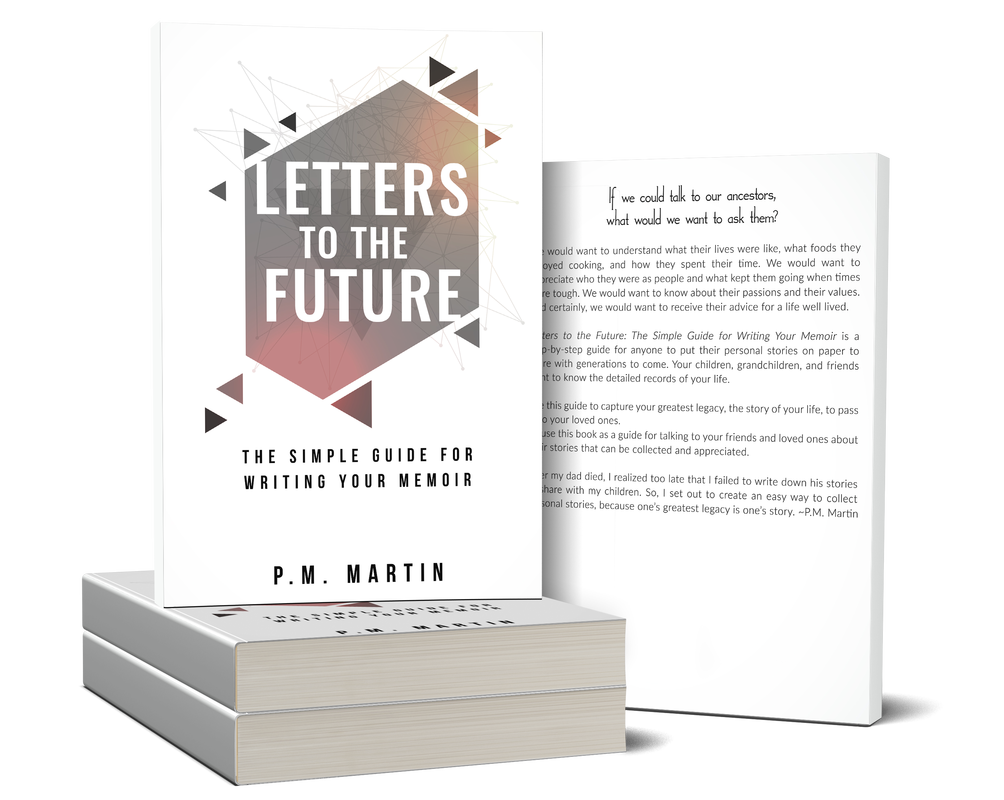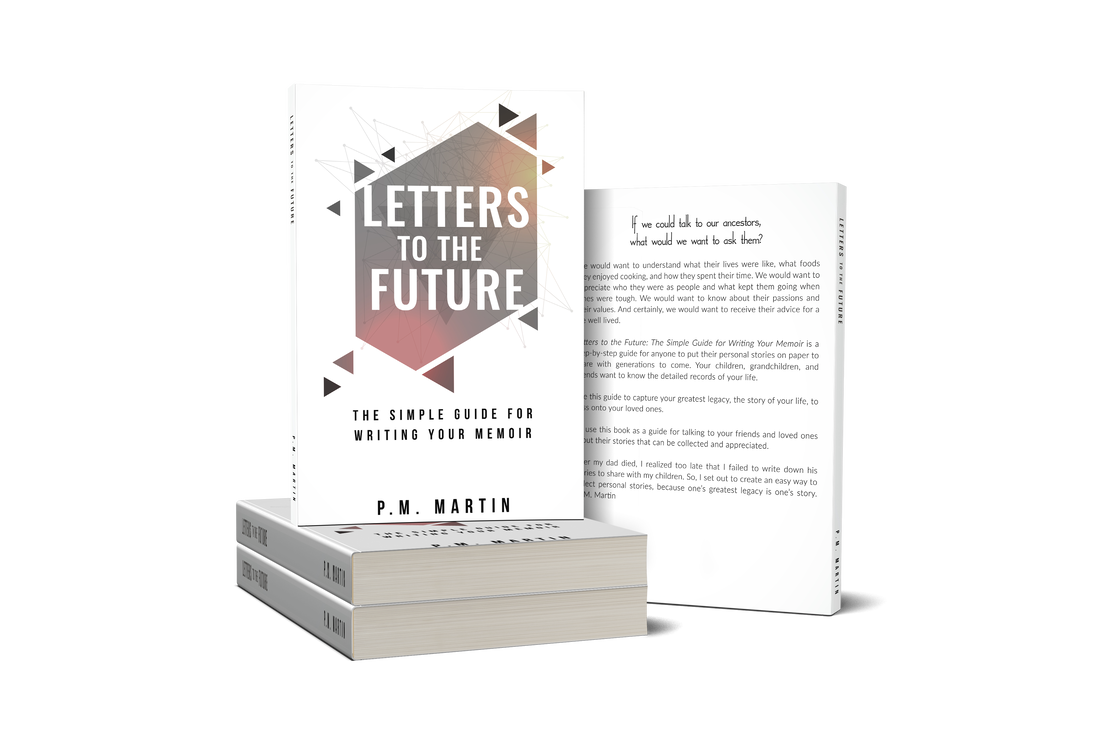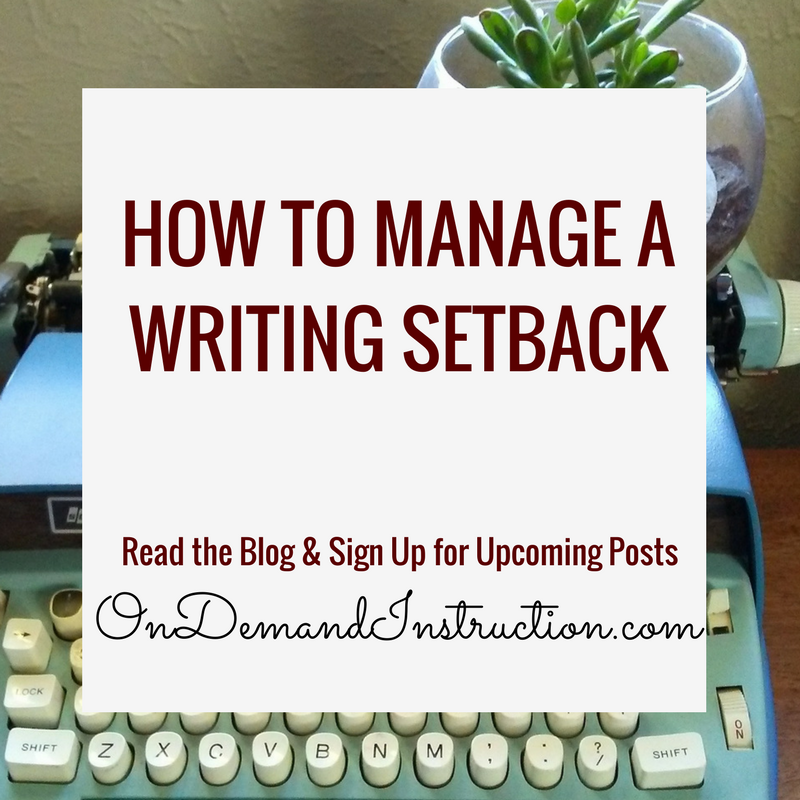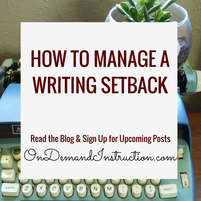 Is a Jane Austen novel your cup of tea? How about an Agatha Christie mystery with a fair number of twists and turns? Perhaps an Ernst Hemingway short story gets you up in the morning? What type of story is it that allows you to connect with the storytelling and reading processes? As we move through life, thoughts of the literary giants may tug at our heart strings, but at the end of the day, we most love the stories from people closest in our lives. People rarely walk around telling stories of the literary greats; rather they tell stories of themselves and the people close to them. The kind of stories that we hold onto and repeat over and over include tales like: the story of how your parents met, the tale of how you fell into your career, the narrative of how you traveled the world with just your backpack, the stories of your children when they were young, and your thoughts on how you overcame the challenges life threw at you. These are the kinds of stories that stick with us.  Have you thought about writing your personal stories to save for family and friends? Has the thought of writing your memoir intimidated you? Letters to the Future: The Simple Guide for Writing Your Memoir is a step-by-step guide book that can help anyone collect their personal stories for a memoir. Your stories are your greatest legacy. Preserve your stories for family and friends. Learn more about the book at Preserveyourstory.com When you think about a beloved friend or family member, often the stories are what stand out. Storytelling is a natural part of how human beings interact with each other, teach their young, and instill a sense of belonging and connection between family and friends. We tell stories to explain ourselves, create affinity, and build groups, and we absorb stories for the same reasons. We want to feel connected with those around us. The greatest stories in people’s lives are usually the stories of a grandparent’s journey to a new country, a parent’s struggles through personal challenges, and a friend’s determination to collect rare objects. Our stories build us up, connect us, and create us. The Stories We Remember Are From Our Loved OnesOn July 4, 2012, my step-dad passed after a year-long battle with liver disease. A year later, I lost my childhood best friend to the same disease. Losing the two of them within such a short time period sent me reeling emotionally. My first and most lasting emotion was regret; I felt like I did not take enough time to communicate with them before they passed, even though I had seen my dad the day prior. As I processed their losses, I was reminded of events that we shared together. These memories ran through my mind like a film reel playing nonstop. I remembered that my dad watched golf and fishing shows on television. Typically dads watched football or hockey or soccer, but mine watched golf and fishing, and in fact the television was on all the time regardless if anyone was watching it or not. He woke up at 3am every morning and sat on the front porch drinking coffee and smoking cigarettes; I am pretty sure that my parent’s coffeepot was never turned off. He loved our pets more than anything in the world. My sister had a coffee cup made with a photo of him and the four cats sitting on the couch with the title Cat-Man-Do. The stories of my friend similarly ran through my head. Our first concert was the Psychedelic Furs at Red Rocks in eighth grade. The next year, we saw Duran Duran open for David Bowie at Mile High Stadium. For that one, we waited all night for tickets in front of the ticket-selling office; it paid off because we got tickets in row 10. Her mom dropped off sleeping bags for us to sleep on the concrete bench in front of the shop. My love of music came from her. She taught me how to apply mascara, how to combine colors in my outfits, and how to relieve stress through writing. A year after my dad passed, I visited my aunt who told me stories of growing up with him in northern Indiana. They took a sailboat called The Sunflower onto Lake Michigan as teenagers. He got his head stuck in a wooden dining chair and the chair had to be hacked to bits by his blind grandmother to free him. His mother went into labor with him and took a taxi to the hospital; he was very nearly born in the taxi. As I heard these stories, I clung to them. I cherished them. I started collecting them and holding onto them. The stories became my lifeline to stay connected with my loved ones. Even though they may be gone, I could hold their stories in my hands and read them over and over. So, I began collecting their stories, and over time that process proved to be therapeutic in my grief process. Yes, they were still gone, but I had a little piece of them to hold onto—our stories. The Storytelling and the Story ReceivingThere is a positive therapeutic value to storytelling. When people share stories, they reach out across the void to keep that story alive. Every culture has a tradition of storytelling, of passing stories from one generation to the next—whether that be oral stories shared through family members or historical tales shared in textbooks, people seek to keep their stories alive. In the process of storytelling, we unburden our minds of the realities of life and organize them in a way that we can make sense of and present to others. This process gives writers an opportunity to process the events which may have been confusing or full of conflict previously. When we write, we preserve that which is most important—the memories that make us individuals. Though the narratives of the literary greats enlighten and inspire us, the stories from those closest to us are the ones that we hold closest to ourselves. Those are the stories that we cling tom because those are the stories that speak to us. They tell us who we are, how we connect, what we value, and how we make a difference in the world. The greatest story ever told is your own story. Related Blog Posts Sometimes I wonder what happens in a writer’s planning that makes it so easy to fall off track. No matter what our writing goals are, so many of us fall apart at some point down the path. Essayists get stuck in brainstorming, novelists are overwhelmed with character development, and memoirists lose their mojo half way through a story. One nasty setback can derail a writing project by weeks or more. But, every element of life comes with the risk of failing: our professions grind us down, our kids forget to eat their veggies, and our waistlines expand with each slice of pizza. So, why do we push through the everyday challenges of life but find it so much harder to stick to a writing routine? Having worked with writers as an instructor and coach for 20 years, I believe that a poor plan sloppily executed will sink any writer’s dreams. OK, so if it takes a poor plan and sloppy application to ruin a writing practice, what exactly does that mean? Take a look at a few of the ways that a writer, any writer, can derail their dreams. Avoid Reading I genuinely cannot make sense of writers who do not read. That is up there with chefs who do not eat, tailors who do not wear clothing, and skiers who do not like snow. How does a writer not read and expect to be able to write? I really do not understand. Strangely this phenomena is fairly prevalent. I meet writers who have something to say but are unwilling to read the messages shared by their contemporaries. Due to the complications of modern life: pervasive technology, busy schedules, and lacking creative communities, some writers can hide under the idea that their messages are paramount in importance in the literary world. There is no settled rule about what writers should read, but avoiding reading altogether is a certain step on the road to failure. Failing to read separates a writer from the writing community. Writers who fail to read fail to make an effort to connect with the greater community of writers, fail to observe what good writing looks like on the page, and fail to open themselves up to the growth process to be had from the writing process. Writers who do not read will not write for long or successfully.  Have you thought about writing your personal stories to save for family and friends? Has the thought of writing your memoir intimidated you? Letters to the Future: The Simple Guide for Writing Your Memoir is a step-by-step guide book that can help anyone collect their personal stories for a memoir. Your stories are your greatest legacy. Preserve your stories for family and friends. Learn more about the book at Preserveyourstory.com Avoid Writers Books, films, and stereotypes have created a popular image of a writer as a tortured artist who types away in a grimy basement apartment into the dark hours. We have bought into the idea that writers are socially anxious, awkward, and even anti-social creatures. We tend to think of a writer as a lone wolf without a single friend to provide comfort and understanding. Nothing could be further from the truth. Some writers take time away from the noise of life to attend a writer’s conference or to spend a couple of days working on a book project. But overall, writers a highly social, caring creatures. If writers did not care so much about the world, we would not write, because one of the reasons that we write is to make a difference. Writers who connect with other writers are not only better connected professionally, but they are better supported in their communities. Writers who pound away in the dark room of loneliness are missing out on the opportunities of local workshops, writing mentorships, and courses that can help them develop their skills. Writers who avoid other writers are missing out on one of the best methods of keeping the mojo flowing. Avoid Accountability I’ll write when the feeling moves me. I’ll write when I get around to it. I’ll get to some writing later on. I don’t feel like writing today. Have these words ever escaped your lips by chance? Regardless of what genre we choose, writing can be hard work, and for some people, when the work gets hard, they tend to avoid the task. When we avoid that which is hard, we leave the paths that lead to our goals. Writing a novel, a series of articles, or a letter to a friend can be incredibly hard work. Writing is an activity that pulls from every energy source people have: the emotional, physical, mental, and philosophical. It takes a lot of grit to write. Without accountability, would we show up to work on time, stop ourselves from eating a second slice of cake, or bother heading to the gym? Perhaps not. But we know that we could lose our jobs, gain a few pounds, or lose our health muscle mass if we do not follow through. Writing is the same. Writers need some kind of accountability. Sure, there are some people out there who are doodling on napkins, jotting down stories during the commercials, and cranking out novels at breakneck speed, but most of us need at least a little nudge to stay on the path. Create accountability by working with a writing partner and sharing with each other what you accomplish. Join a local writing group, especially one that expects you to write in between meetings. Attend writer’s workshops; these are available both in person and virtually. Keep track of your daily word count and set goals around how much to write on a daily, weekly, or monthly basis. Avoid Taking Chances Ineffective writers stick close to their comfort zones. They avoid trying new things, they push mentorship and challenge away, and they spend an amazing amount of time making excuses for not meeting their goals. They do not take chances. A few years back, a friend of mine shared a novel idea. I offered to be a writing partner so that we could encourage each other and gave her some ideas of how to use the writing process. She then spent the next three years complaining about how I got her off track, and in those years, she made no progress on her novel. As writers, our craft makes life an ongoing challenge, because no matter what is happening in our lives, we still have the drive to put words to paper. And considering that a novel can easily take a year or more to compose, sometimes we may feel like avoiding challenge may be the easier path. Writers cannot know how well they write poetry if they do not take the chance to sign up for a poetry workshop. They cannot consider their options with a memoir if they vehemently stick with short stories. And they cannot improve their skill sets without considering working with a mentor or editor. We all get stuck in a rut now and then, and we are all challenged by the intricacies that the writing life has to offer. But at the end of the day, we still want to write; the drive to write is what makes us writers. So, if being a successful writer is of interest to you then, read, connect with other writers, hold yourself accountable, and take chances in your writing practice. You do not know what you are made of until you push yourself. Related Blog Posts |
About the SiteWelcome, Writers! Archives
September 2023
|










 RSS Feed
RSS Feed